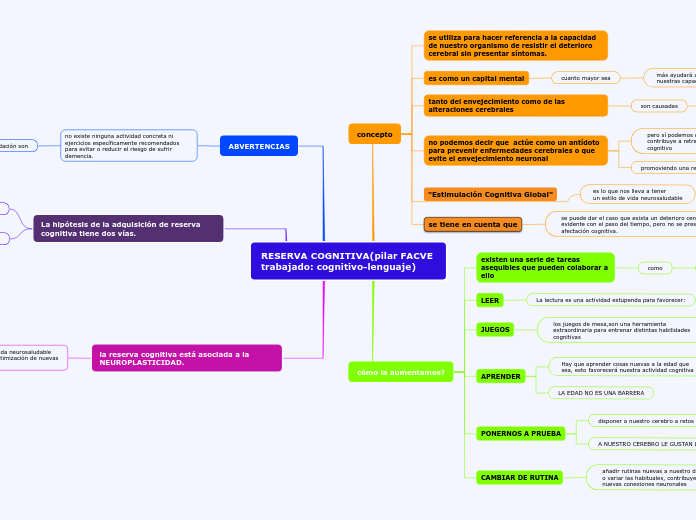av Gabriela Rivera för 4 årar sedan
285
RESERVA COGNITIVA(pilar FACVE trabajado: cognitivo-lenguaje)

av Gabriela Rivera för 4 årar sedan
285

Mer av detta
In linguistics, syntax is the set of rules, principles, and processes that govern the structure of sentences in a given language, usually including word order.
A compound sentence is a sentence that has at least two independent clauses joined by a comma, semicolon or conjunction. An independent clause is a clause that has a subject and verb and forms a complete thought.
una serie de prácticas muy recomendables para mantener activo el cerebro y favorecer la reserva cognitiva.
A complex sentence is a sentence that contains an independent clause and one or more dependent clauses.
An independent clause can stand alone as a sentence, but a dependent clause even though it has a subject and a verb cannot stand alone.
Attributive clauses serve as an attribute to a noun (pronoun) in the main clause. This noun or pronoun is called the antecedent of the clause.
elegir otra ruta para ir al trabajo, cambiar la organización de los cajones o utilizar los cubiertos con la mano contraria.
An adverbial clause is a group of two or more words that function as an adverb in a sentence.
Busquemos algo que sea realmente un reto que podamos asumir.
un crucigrama hasta hacer un sudoku o montar un puzzle
An appositive clause follows another noun or noun phrase in apposition to it; that is, it provides information that further identifies or defines it.
un nuevo idioma, tocar un instrumento musical, asistir a clases o charlas de cultura general o perfeccionar nuestras dotes en la cocina.
The subject clause is a dependent clause that acts as a subject.
se estimulará el cálculo, la memoria reciente, la lógica, la capacidad de planificación, el vocabulario o la creatividad.
A predicative clause may be introduced by conjunctions - that, whether, whether... or, as, as if, as though, because, lest, the way - or connectives.
The latter may be conjunctive pronouns - who, whoever, what, whatever, which - or conjunctive adverbs - where, wherever, when, whenever, how, why.
la concentración, ejercitar la memoria y alimentar la imaginación.
The object clause is a phrase on which a verb performs an action. It falls at the end of a sentence, and is governed by a verb or a preposition.
leer,jugar,aprender,ponerse a prueba y cambiar las rutinas
An adverbial is an individual word (that is, an adverb), a phrase, or a clause that can modify a verb, an adjective, or a complete sentence.
The attribute is defined as a quality or characteristic of a person, place or thing.
por demencias como el Alzheimer.
The predicate of a sentence is the part that modifies the subject in some way. Because the subject is the person, place, or thing that a sentence is about, the predicate must contain a verb explaining what the subject does and can also include a modifier.
más ayudará a compensar los efectos en la eficiencia de nuestras capacidades cognitivas.
The subject of a sentence is the person, place, thing, or idea that is doing or being something. You can find the subject of a sentence if you can find the verb.
Ask the question, 'Who or what 'verbs' or 'verbed'?' and the answer to that question is the subject.